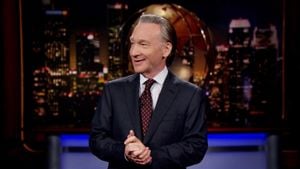The conflict between Ukraine and Russia has reached new dimensions, especially as diplomatic channels become more prioritized by leaders on both sides. The war, which has seen its fair share of heroism and tragedy, is at a point where solutions seem elusive, but there have been significant shifts toward exploring effective diplomatic resolutions.
Recently, Ukrainian President Volodymyr Zelensky publicly acknowledged the difficulties Ukraine faces on the battlefield. "We do not have enough forces to return Crimea," he stated, emphasizing the pressing need for Ukraine to seek diplomatic solutions instead. This admission signals a notable shift from the previously prevailing sentiment of unconditional resistance against Russian advances.
Crimea, which has been under Russian control since its annexation in 2014, is not just of strategic importance for Ukraine. Zelensky indicated its significance extends to global food security, stating, "whoever controls Crimea controls security in the Black Sea." The connection between Crimea’s control and global agricultural markets is undeniable, as Ukraine is one of the world's largest exporters of wheat and corn, which are blocked during conflicts.
Official reports reveal the shifting public sentiment within Ukraine as well. A recent Gallup poll showed more than half of Ukrainians want the war to end quickly, contrasting sharply with the 73% majority who previously supported fighting until total victory. This shift reflects growing war weariness among both officials and civilians, as military setbacks on the frontlines continue to mount.
Former Ukrainian Foreign Minister Dmytro Kuleba echoed these sentiments, admitting last week, "things look bad on the battlefield." He resigned from his position, which highlighted the growing pressure on Ukraine's government to reassess its strategies and outcomes. Kuleba pointed out the popular will of the Ukrainian people as a significant factor, indicating to his countrymen, "the Russians keep the Donbas, they keep Crimea, no NATO membership. Can Zelenskyy sign? He cannot because of the Constitution." This reveals the politically sensitive nature of negotiating peace deals and territorial concessions.
Meanwhile, Donald Trump, newly re-elected as President of the United States, outlined his own proposed plan for resolving the conflict. Trump’s strategy involves utilizing American influence over both Ukraine and Russia to push for agreements. His outline suggests Russia retains its occupied territories, including Crimea, but delineates establishing security guarantees for Ukraine without immediate NATO membership. The approach is reminiscent of the Cold War-era dealings, akin to agreements made at Yalta and Munich, which many political analysts see as troubling precedents.
Under Trump’s proposal, specific battleground realities would form the basis of negotiations, where both Ukraine and Russia might have to compromise on some fronts. Critics of this approach warn it might set problematic precedents for future international conflicts, potentially undermining Ukraine's sovereignty.
The experts caution against hasty diplomatic agreements without thorough evaluation. The precarious balance of power could either stabilize or destabilize international relations, depending on how Western powers, particularly the US and EU, engage with Russia moving forward. Trump’s negotiation style, often viewed through the lens of unpredictability, could either force predictable outcomes or escalate tensions even more.
Critically, any negotiations would require genuine reassurances for Ukraine about its territorial integrity and security needs post-agreement. Zelensky underscored the importance of credible security guarantees before meaningful discussions could begin, indicating he believes the key lies not only with Ukrainian resolve but also with unified and strong Western support against future Russian aggression.
Although Zelensky acknowledges the necessity of seeking peace, he remains adamant about not making any concessions without the backing of solid military aid and clear pathways for security guarantees from NATO allies. This stance ties to the long-standing Budapest Memorandum, which promised Ukraine security guarantees upon giving up its nuclear arsenal—an agreement many feel has been violated by Russia’s aggressive actions since 2014.
The diplomatic discussions are now starting to prioritize aspects such as Ukrainian NATO membership as both Zelensky and Kuleba highlight the need for Hungary, Poland, and the Baltic States to support security arrangements. This opens discussions around NATO’s role moving forward, as they assess how to best fortify alliance mechanisms for its Eastern European partners.
Zelensky's tone reflects this urgency — "If we want to stop the hot phase of the war, we need to take under the NATO umbrella the territory of Ukraine we have under our control," he emphasized recently. His call for quick action suggests the need for NATO to solidify its support and formalize Ukraine's place within the alliance, even if it doesn't mean full membership immediately.
All these developments are indicative of the Ukraine-Russia conflict entering a new phase, one where diplomacy and the potential for negotiation are becoming increasingly necessary. Both sides appear poised to explore paths toward resolution, yet the balance remains precarious. Time is of the essence as the humanitarian crisis deepens, and with global food security threatened, the urgency for resolution cannot be overstated.
While the potential for establishing peace seems present, many know the outcomes hinge on the willingness of both Russia and Ukraine to accept compromises, which, historically, have been hard to secure. It remains to be seen how the geopolitical web surrounding the conflict evolves and what influence the upcoming U.S. presidency will have on all parties involved. The focus on dialogues, the willingness to negotiate, and the significance of international support appear to be key ingredients to potentially easing hostilities and establishing long-term peace stability.



